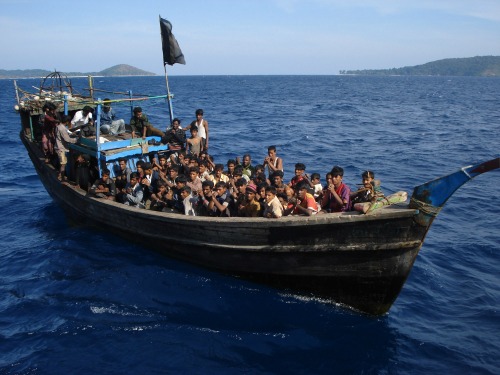
Imagine the grounds of Arafah filled with 5 million pilgrims and then imagine 2 million of them them wiped away. That is the story of the decades of extermination of the Muslims of Myanmar, the Rohingya, the world’s most persecuted minority.
On July 20, 2014 the Zakat Foundation of America hosted the third annual iftar at the Burmese restaurant Mandalay Restaurant and Cafe for a tri-fold effort of educating, raising funds while networking with activists. Mariam Mehter’s family is from Burma. With the help of her sister Khadijah Mehter, Hena Zuberi and Dr. Naba Sharif, she arranged an evening of support for the Rohingya.
Dr. Sharif shared how she got involved in the cause of the Rohingya because they were ignored by many in the mainstream.
There are only about a hundred Rohingya living in the United States. One of them is Dr. Wakar Uddin, Director General of the Arakan Rohingya Union. A professor at Penn State University, he is a firm believer in a multiethnic-multicultural federal Burma.
He discussed the current crisis in Burma's western most Arakan State (Rakhine). He informed the guests that the Rohingya were ethnic Burmese and were painted as outsiders by the military junta and its propaganda machine. The crisis averts the attention of the Burmese people from the real economic and social problems that plagued the country, said Dr. Wakar Uddin, who was raised and educated in Burma.
The Rohingya are called ‘Bengali’ and have been denied citizenship rights since 1982 and are treated as illegal immigrants in their own home. They are not allowed to hold jobs, have more than 2 children, go to school or travel even between two villages. A quarter million have fled to neighboring Bangladesh.
Human Rights Watch has accused the Burmese government of a campaign of “ethnic cleansing.”
The United to End Genocide completed a four week fact-finding mission to Burma in March of 2014. What they discovered was extremely alarming: “Nowhere in the world are there more known precursors to genocide than in Burma today. Hundreds have been killed with a death toll mounting daily, tens of thousands have fled under the most hazardous conditions, and 140,000 have been forced into horrible, overcrowded camps where they face severe restrictions and are denied basic necessities including medical care.”
Coincidentally, the State Department iftar had been cancelled the same day due to Secretary John Kerry's visit to the Middle East.
The Director of Zakat Foundation of America, Murat Kose, explained how his organization gets the donations to the Rohingya into the refugee camps in Bangladesh. Due to prejudice in Bangladesh, the Rohingya are not allowed to get married outside the refugee camps and aid to them is severely restricted.
Many have been trafficked to Thailand where the men are held in hard labor camps and the women are sold into the sex trade, said Dr. Wakar Uddin.
A gofundme online fundraiser to support Zakat Foundation's Ramadan campaign to provide food packages to the Burmese refugees in Bangladesh and to the Rohingya in the Rakhine state of Burma was also taking place simultaneously.
Simon Billenness, Interim Executive Director of the U.S Campaign for Burma, informed the audience of the various lobbying and political effort made for the Rohingya. Two years after violent burning of villages that left thousands homeless, the United Nations says that 135,000 ethnic Rohingya Muslims are still cloistered in refugee camps on the western coast of Burma.
The U.S. government paints a rosy picture of the democracy in Burma, says Billenness. It is a feather in President Obama’s foreign policy cap, where decades of military rule has changed to democracy guided by American diplomacy. There is intense pressure from U.S. companies to normalize relations as the Europeans countries have eased sanctions and US companies feel like they are left behind. Obama is scheduled to travel there in November for a regional conference.
Hena Zuberi conducted the fundraising and urged the audience to pray for the Rohingya with the same passion as they would for their own siblings in the Ramadan nights.
The event raised upwards of $10,000 from the 50 people who had gathered and their online friends. An additional $1500 was raised for the US Campaign for Burma. The fact that most of the attendees were young professionals who are connected and social media savvy was a good sign.
The guests were served a traditional Burmese dinner of Tea Leaf Salad, Ginger Salad, Coconut Rice, Tilapia Curry, Coconut Tofu, Khawswe Jaw (fried noodles), and flat noodles with tofu.
The biggest setback to the Rohingya cause is that many people are uninformed of their persecution as their stories are seldom shared. Tell someone about the Rohingya, advocate for their rights, keep them in your prayers and donate generously to their cause.









Comments powered by CComment